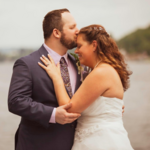
Whitney is a 35-year-old licensed mental health counselor, wife, singer and trumpet player. Her husband, Elliot, was diagnosed with stage IV colorectal cancer at 31. She has lived with Crohn’s disease for many years. Before his diagnosis, her husband was her caregiver when she was ill. Once Elliot was diagnosed, Whitney “dropped everything” to be his caregiver.
As someone who needed care throughout her life, it was a unique experience for Whitney to switch roles to being the caregiver. She says that being a caregiver could be “terrifying and heart-wrenching” and that she felt utterly helpless sometimes. “It’s definitely the hardest thing I have done in my entire life.”
Whitney had to shift her priorities to care for Elliot. She recalls a previous time when she was in the hospital herself for treatment when she thought she would regret not getting her doctorate and not having children. Before her husband’s diagnosis, she was in a doctoral program and was trying to start a family with him.
Once her husband was diagnosed, Whitney had to shift these life plans. She realized she wanted to prioritize spending time with Elliot and her other loved ones. Feelings of grief and loss, especially about her desire to become a mother, came up while Whitney was coping with changed life plans.
After Elliot’s diagnosis, she relied on a close-knit group of friends who were also mental health professionals. “They knew that even if I said I’m okay, that they might need to swoop in, in other more quiet, less demanding ways to uplift our spirits. And they did just that.”
Some people in her community were less helpful. Whitney particularly struggled when people told her to “think positive” or “it’s going to be fine” rather than acknowledging her complex emotions. As a mental health professional, she was able to effectively communicate that these statements were not helpful.
Even with supportive people like her friends, Whitney wanted to receive mental health support for herself and Elliot from unbiased people not personally involved in the situation. At first, she struggled to find support. After three months, she discovered CancerCare by attending a discussion forum addressing young adult caregivers. Once she was able to find free counseling through CancerCare, she felt a “sigh of relief.”
Elliot’s treatment included intense chemotherapy, radiation and a 10-hour surgery. Everyone was “thrilled” about how he responded to the treatment. In 2022, he was deemed “no evidence of disease,” meaning the doctors did not see any cancer. However, Whitney explains, “Just because cancer is not evident currently does not mean that it is not somehow still affecting your life."
This post-treatment stage brought up complicated feelings for both Whitney and Elliot. Elliot had to transition to feeling “human” again while coping with cancer treatment’s lasting physical and emotional effects. Whitney had to cope with balancing feelings of celebration with fear, anxiety and depression, describing it as “a whirlwind of emotion.”
She and her husband also had to cope with some family members who did not understand that “no evidence of disease” does not mean that Elliot’s cancer is cured. Some people did not understand the unique trauma they had been through.
Whitney has advice for other caregivers of people living with cancer. She stresses the importance of taking detailed notes at doctor’s appointments, which allows caregivers to remember important information about how to help their loved ones, even when they feel they cannot absorb the information. “As much as you want to be the shoulder to cry on, the person to lean on, the information center, the care center, the complaint center, some of those areas take holidays and usually it’s the information center when you’re really, really anxious. So, find different ways to retain the information that’s not just your brain.”
“Don’t be afraid to reach out for help and find someone to talk to,” Whitney says, while stressing the importance of mental health support for caregivers. She suggests finding a safe space to let your emotions out, without worrying about judgment, at least once a week. CancerCare’s free counseling program provided her with this space. “I was able to take one worry off of my plate and my husband’s plate and was able to find some caring professionals who we could truly speak with about what was going on and we felt understood. That was worth so much to both of us, so we really are appreciative of everything CancerCare does.”
